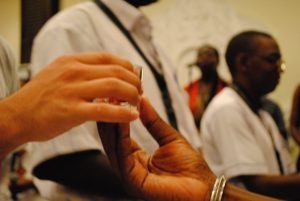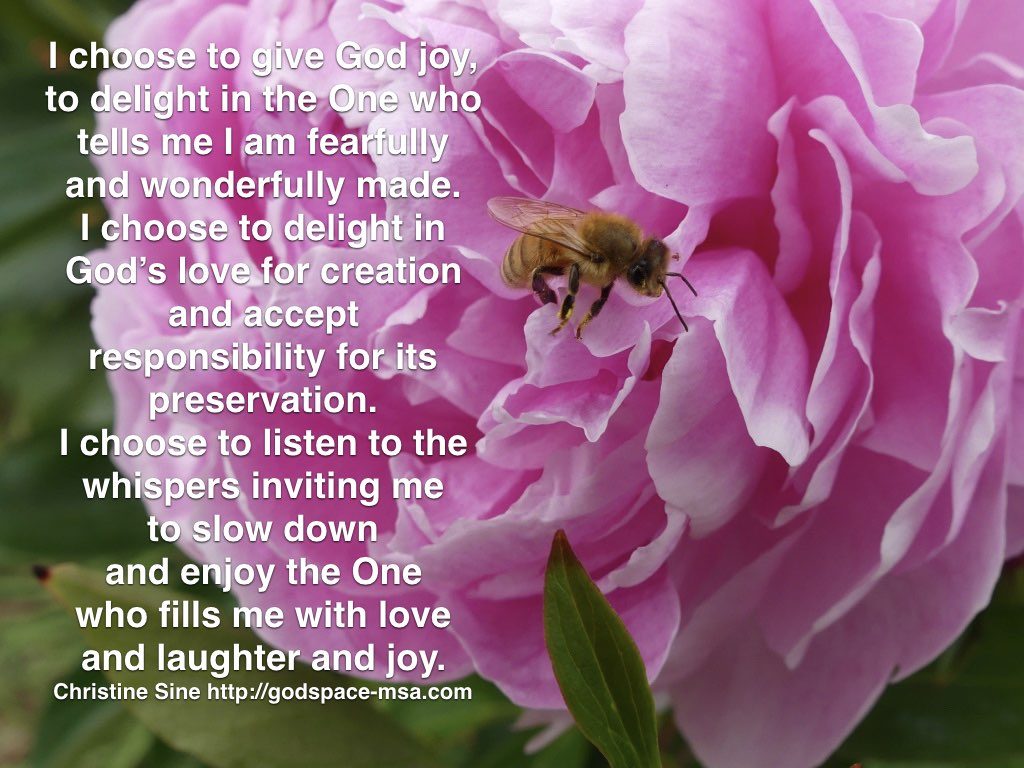
by Christine Sine
Tom and I are getting ready to head overseas on Wednesday to celebrate our 25th wedding anniversary. As with my trip to Australia, I have spent a lot of time thinking about what I my spiritual observances could look like during this time.
What could I do that would give God pleasure while I am away I am wondering? My number one spiritual practice for the trip is just to enjoy it and notice the presence of God in all I do and all I meet. I especially want to be attuned to enjoying Tom, the places we visit and the many friends we will reconnect to. This is not a time for intense scripture study or for feeling guilty about the lack of lengthy times of prayer. Delighting in revisiting places we first journeyed to 25 years ago, having dinner with friends and sailing through Holland, Germany Austria and Hungary on a river cruise will delight us and I think delight God as well.

I realize though, that this trip provides a unique opportunity to create a fun spiritual adventure. My focus is I choose to give God joy. A new journal and a couple of creative exercises that I think will strengthen my faith and draw me into God’s delight are in my luggage.
Just getting ready for the trip was fun. I thoroughly enjoyed looking for a new journal, browsing Pinterest for inspirational ideas on creative spiritual exercises and new ways to record my thoughts and reflections. I have thrown in some of my coloured gel pens and printed out some of my favourite prayers. I am looking forward to new ideas and expressions flowing from my time away.
I have already written on the front page of the journal with questions I hope to reflect on as we travel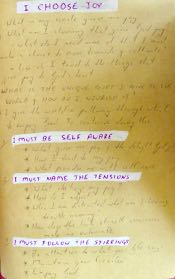
The joy of the Lord is my strength (Nehemiah 8:10)
- What gives God joy?
- What do I enjoy about God?
- What does God enjoy about me?
- What are the tensions that destroy my joy and how do I deal with them?
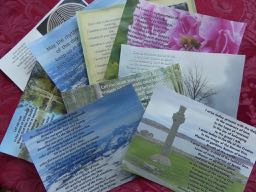
What is your response?
Sit quietly for a few minutes in an attitude of prayer and think about the next few months. Perhaps you would like to ask yourself the same questions I have written down. Are there ways that you could intentionally reshape your spiritual life over this season to bring greater joy to the heart of God and greater appreciation of the joy God takes in you?
By Mary Harwell Sayler —
Praise God the Creator
of all good!
Praise God the Father
of all pure love.
Praise God the Sower,
Who seeds our soiled selves
with Holy Spirit,
nurturing praise and all
blessed notions that
spring to our minds
like flowers.
Mary Harwell Sayler, © 2017, from the book PRAISE!
By Mary Harwell Sayler —
Praise God the Creator
of all good!
Praise God the Father
of all pure love.
Praise God the Sower,
Who seeds our soiled selves
with Holy Spirit,
nurturing praise and all
blessed notions that
spring to our minds
like flowers.
Mary Harwell Sayler, © 2017, from the book PRAISE!
By Lilly Lewin —-
This has been one of those weeks where the worries and cares of the world have pushed in and stolen my joy. If you are familiar with the Enneagram personality numbers, I am a 7: Think Mary Poppins and Tinker Bell or Peter Pan, always ready for an adventure and fun and avoiding pain and suffering at all costs! Thanks to the news and social media, I couldn’t escape the tragedies of shootings and fires and children being killed in their kindergarten.
With so much pain and suffering happening around the world and in the lives of people we know and love, our joy and peace can easily be stolen away. For Freerange Friday today, I would like to give us all permission to have some fun this week! We need to recapture the freedom and joy of innocent children and allow Jesus to love us as we seek to play and have fun. Jesus invited the children to come hang out with him, despite his follower’s objections. Jesus stood a child in their midst and said that we all must be like little children in order to receive the Kingdom.
So what makes you feel like a kid? What brings that sparkle of joy and mischief into your eyes?
How do you have fun? How did you have fun as child?
When was the last time you felt the freedom and joy of playing or laughed out loud with abandon?
For children, play is a serious business. Play is how children learn. Researchers are warning that we are corrupting the flow of learning by sitting younger and younger children in front of screens. In fact, we are now calling the generation from zero to 13 “screeners.”
I want to invite us this week to take time away from screens and rediscover PLAY and FUN.
I believe PLAY is holy and an act of worship. I believe that God is playful and created fun. One cannot look at the abundance of colors in nature, the beauty of a sunset or the creativity of the animals not to get God’s playful side. Giraffes, hippos, frogs in bright colors, monkeys that howl, laughing hyenas, whales with horns…. just to name a few!
So your mission is to embrace you inner five year old or that hidden eight year old!
What things made your much younger self smile? What did you do for fun?
What things do you wish you had done more of as a kid?
What things do you “put off” or not allow yourself to indulge in because you are a “grown up”?
Look through the list and circle a few to try. Add your own ideas!
I believe play and fun need to be a spiritual practice.
So let’s practice! I have outside and inside things to do.
Like all practices we need to be intentional and pay attention as we engage them.
What do you notice about yourself as you play?
Imagine Jesus sitting across from you or playing along side you in your activity.
See Jesus smile and feel his love shining through his eyes towards you!
Try something on your own and then invite others to play too! You might try this as a small group or with your community. Maybe you have kids at home who can help you play and have fun! As a mom I had to be reminded to stop and play because often I got too busy with the tasks of life to stop and play with my boys. The dishes and laundry will wait! The emails will be there tomorrow, so will facebook! Make an appointment to have fun!
Things to help you play and have fun:
- Go to a bookstore or the library and read books in the children’s section
- Buy your favorite ice cream at the store or go to an ice cream shop and get a cone!
- Stop at a drive through a buy a milkshake or make one at home!
- Go to a toy store and look around.
- Give yourself permission to play with the toys!
- Ride a Bike
- Skip rocks on a pond or lake
- Swing on a swing
- Investigate a stream, pond or even a puddle!
- Jump in the puddles and get wet!
- Go swimming or play in the water
- Walk barefoot in the grass
- Lay down in the grass and watch the clouds or look at the stars
- Build a fort with blankets in the living room
- Read with a flashlight under the covers!
- Fly a kite
- Blow bubbles!
- Hit a tennis ball or shoot hoops
- Search for frogs or fireflies
- Get some sidewalk chalk and draw on the sidewalk
- Find some crayons and color for fun
- Create a collage with magazine pictures
- Finger Paint
- Make some playdough or get some clay and make snakes or other creatures just for the fun of squishing them!
- Get a joke book and read them outloud!
- Find some friends and play kickball or kick the can or some other outdoor games from your childhood.
- Go to a museum and go to the children’s section and do the activities.
- Find a friend and play cards or checkers or a board game for fun not to win!
I’d love to hear what is on your FUN PLAY list and what you try!
Let’s make fun and play a practice in the days and weeks ahead. And watch God smile!
Some Pharisees are trying to trick Jesus, and they bring a woman to him. They caught her in the act of committing adultery. Jesus says that only the person who has committed no sin can condemn her, and the crowd of accusers slips away. Only Jesus and the woman are left. He says to her, “Neither do I condemn you. Go your way, and from now on do not sin again” (John 8:11).
Jesus does not condemn a woman who has broken God’s law and human laws. Yet, at the same time, he calls her to be her best self in the future. Balancing these two components of his answer is part of how we get into trouble. Many of us were influenced by parents and teachers who tried to help us be our best selves by shaming us and criticizing us. So we think that in order to grow into the people we want to be and were meant to be, we need to shame and criticize ourselves.
We think that treating ourselves gently is a form of self-indulgence, and self-compassion can work that way if it is not coupled with a call to excellence, health and growth.
For the past four weeks I’ve been writing about my new spiritual practice: separating thoughts from feelings, feeling the feelings and letting the thoughts go if they are not healthy. In order to feel the feelings, I’ve been using a process with acronym, RAIN. Advocates for RAIN call it a form of self-compassion. Here I want to address the question of the appropriateness of this practice for Christians, using an illustration from my own life right now.
One of the major stressors in my life is our upcoming move from New Zealand, where we have lived for ten years, to Seattle, where we lived for 30 years. I have moments of fear about getting all the details done on time for the move. I have moments of anxiety related to new patterns of relationships after we arrive. I feel sad about leaving this beautiful place and the friends we have made. I tend to overeat when stressed, so I feel angry at myself when I eat too much.
God led us to plan this move, and I want to honor God in the process. Yet I have moments when I’m a mess of unruly thoughts and feelings.
I’m going to imagine that I hear the voice of Jesus saying, “Neither do I condemn you. Go your way, and from now on do not sin again.” What would that look like in practice? Here are my ideas:
- I must not let the voice of condemnation overwhelm me. In fact, I must turn away from that voice as much as possible. Of course I’m feeling a mix of sadness, fear and anxiety. Of course I feel stressed, which always makes eating well hard for me. RAIN helps me feel those feelings but not wallow in them. RAIN helps me feel them but also let them go.
- I must allow Jesus to help me live in as healthy a manner as possible, as free from sin as possible.
(a reflection and a prayer in the wake of a series of chilling atrocities)
Lord of my soul and Lord over my life,
This is the life as we know it:
News, 24/7. Noise. Senses horrified. Unimaginable chaos.
(Well, our imaginations are tainted, seared, and we’re hardly surprised)
Violence, anguish, discord.
Loss. Suffering. Trauma. Retraumatisation. Beleaguered lives.
Inescapable. Inexorable. Contemptible. Insane.
Antipathy against You, Your Good, Perfect, Peaceable Will.
It’s too easy to deny, so sensible to escape.
But living in this divisive world brings no such reality.
Yet, You are our Father.
And, You are the Light of the World, precious Jesus.
God, Your Spirit shines out of us into our world.
Your Spirit, Your Life, Your Glory, Your Love.
If we let it. If we would.
Let it, Lord. Let it be as You will.
Change my thinking. Subsume my thought.
Chastise the instinctiveness of my reaction. My humanity. My ‘wisdom’.
Make me to be still and quiet. To hear Your voice placating, settling, soothing.
Advise me in my response, how, right here, to allow Your Light to shine out of me. And nothing else.
Make Your ways mine, at my surrender this moment, and moment by moment; my worship.
Such a motivation, and such empowering, can only come from You, alone. I need You.
Quell the darkness, Lord, which makes its haven within. Let Your Light have its way.
Make me to belong here, to believe, and to behave as You have imagined me to.
Make me merciful and compassionate to all persons, all the time.
Help me be who You have created me to be. Today. All ways.
AMEN.

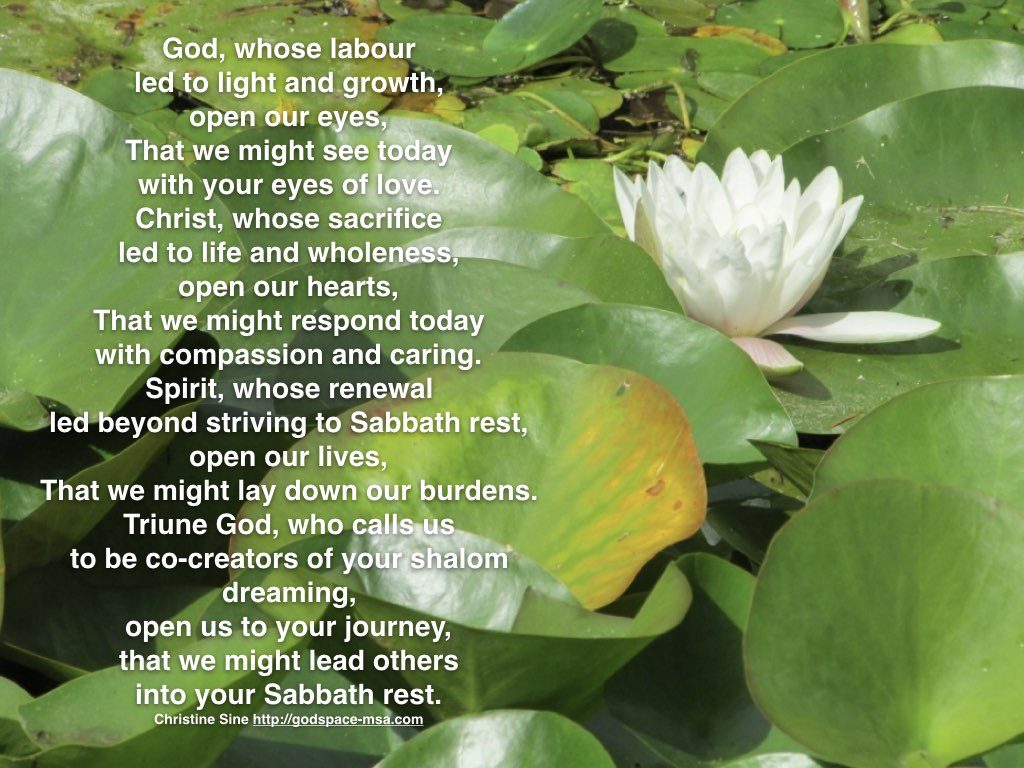
by Christine Sine
In her book Jewish Days: A Book of Jewish Life and Culture, Francine Klagsbrun introduces us to the wonder of the Sabbath day. She calls it a miracle because no such day existed until it appeared full-blown in the Talmud – and it is the one rhythm of life that has no counterpart in the natural world. She reflects on her father’s impressions of the Sabbath or Shabbat as it is called in Hebrew. “‘When I was a young man, an immigrant from Russia,” he would say, “the United States had no labour laws regulating working conditions. People worked long hours, seven days a week, without rest. But imagine, more than three thousand years ago the Bible commanded that all work stop for an entire day every single week, and not only for the ancient Israelites but for all who lived among them, including slaves. And not only for people, but for animals as well. What a revolutionary practice that was. What a miracle!” Klagsbrun explains, “the rhythm of the Jewish calendar flows around this day of rest and reflection. In every week of every month of every year, the Sabbath arrives to re-create that moment after Creation when God rested and the entire cosmos was in peace and harmony. Shabbat may be a miracle, as my father taught me. It is also a unique gift only fully appreciated when used.”
The celebration of Sabbath rest, is one of the most beautiful rituals in Jewish culture. At dusk on Friday joyous services at the synagogue welcome its arrival. Even before that Jews focus on preparation for this day that is for many, the culmination of the week, the day that sets the purpose for every other day. The ritual greeting, Shabbat Shalom, bridges the close of the work week and the beginning of the Sabbath celebrations. Sabbath is a family event. The woman of the house lights two candles to symbolize the first act of creation, the separation of light from darkness and a canopy of peace and repose descends as the family sings a Sabbath hymn. Then there is a time of blessing – parents bless their children as an act of love and concern, then they pay tribute to each other by singing from the Book of Proverbs. The kiddush, recited over a brimming cup of wine, sanctifies the Sabbath before dinner beings.
There is no better place to connect to God’s rhythms than in the reclaiming of Sabbath and our God ordained need for rest and spiritual refreshment. Evidently in Jesus’ time Romans despised Jews for their day of rest. They viewed it as a sign of laziness, though some did recognize its importance as a time of refreshment for the body to provide renewed strength into the week ahead. From the Jewish perspective however, the Sabbath day is far more than a day of rest to allow our souls to process the data input of the previous week into wisdom – a view which is probably more Greek or Roman than Hebrew. For the Jews, Sabbath is fundamental to life and to both their spiritual and emotional health – it is the culmination of the week, the day that gives purpose to all other days.
Sabbath – a glimpse into God’s delight.
The miraculous and awe inspiring quality of Sabbath is made apparent by Jewish philosopher Abraham Heschel in his book The Sabbath. Evidently ancient rabbis puzzled over Genesis 2:2 “On the seventh day God finished His work” which implies that there was an act of creation on the seventh day. “What was created on the seventh day? Tranquility, serenity, peace and repose.” The rest of Sabbath is far more than the withdrawal from labour and exertion we tend to associate it with. It is the rest and harmony of life as God intended it to be.
For Heschel the essence of the world to come is Sabbath eternal, and the seventh day is a foretaste of that world. One day out of every seven we have an opportunity to glimpse eternity, to experience the joy, the tranquility, the peace and the abundance of life as God intended it to be. No wonder Jesus healed on the Sabbath. No wonder he constantly criticized the legalisms and restrictive rules the Pharisees had inflicted on the people that robbed them of their joy and freedom. He wasn’t downplaying the importance of Sabbath as a holy day, he was giving the Jews a glimpse of what Sabbath was meant to be, the culmination of their week, the goal of all else they gave their time to – a glimpse into the wholeness, and abundance of God’s shalom future when all will be healed, fed and provided for. Imagine what a difference it would make if we all viewed Sabbath as a day for connecting to the joy of fellowship with God, for enriching relationships with others and for enjoying the glories of God’s creation.
Sabbath – God’s future breaking into the present
Christianity incorporated the spirit and beauty of the Sabbath into its theology. However most Christian traditions transposed it to Sunday, the first day of the week and connected it to the resurrection of Jesus. Early Christians called this the eighth day. Because they believed God began the creation of the heavens and the earth on the first, first day, Christ’s rising on another first day, centuries later meant God was beginning a new creation. The Jews yearned for a future in which Sabbath was not just a day but a way of life seven days a week and in Christ, Jesus followers believed that new world was opened to them. According to David Chidester in Christianity: A Global History “In coming together for collective worship on that sacred day, a day that signified the creation of the world, the resurrection of Christ, and the transcendence of ordinary time, Christians could imagine that they had already entered the new world promised at the end.” Just as the Sabbath was the culmination of the week for the Jews, so Sunday was for Christians. It is meant to be a day that realigns our whole life to God, to our families and others with whom we share this planet, and to creation.
The Sabbath is a day not just to rest our bodies but also to enrich our souls and spirit, a day to recall with joy and gratitude the wonder of our salvation and God’s redeeming activity in our lives and world. This is the day that should shape and give rhythm to the week rather than be molded by it – it is a time for worship, for fellowship with others and for enjoyment of God’s creation but is also a day for reflection and for solitude, a time to study the word of God and connect it to our lives.
Reclaiming the Sabbath
In today’s world I don’t think there should be rigid rules for Sabbath keeping. We certainly don’t want to advocate the legalisms of the past. Flexibility needs to be the order of the day. As we change jobs, when our kids leave home or we move to a new city, we may need to reevaluate the practices we establish. In his book Sabbath Time, Tilden Edwards an Episcopal priest who researches Sabbath keeping, urges Christians to be flexible and creative in their embracing of a “Sabbath time” rather than a one day a week observance. He recommends that Sunday be a time to combine worship with play and relaxation and advocates adding a regular rhythm of disciplined spiritual renewal to that during the week.
For many pastors and church workers, Sunday is the busiest day of the week and Saturday or Monday provides a better Sabbath rest. However for most of us Sunday is still the best Sabbath day. If you feel pressure to prepare for the coming week, try starting on Saturday evening. By sundown Sunday Sabbath is over and you can prepare for work. Celtic monks celebrated Sabbath on Saturday. Sunday – the day of resurrection began the new life and work of the week. It began with the Eucharist and celebration of Christ’s resurrection then the monks entered into the work of the week.
Canadians John and Martha found that keeping Sabbath together with two active kids was a bit of a challenge. They decided to give each other a Sabbath break once a month for a day of prayer and reflection. The spouse not on Sabbath retreat spends time with the children. One of the unexpected byproducts is that both parents and kids appreciate each other more after they have been apart for a while.
When we celebrate Sabbath doesn’t seem to matter. What is important is to set aside a day as a holy Sabbath, not just to rest, refresh and connect intimately to God, but in order to glimpse that eternal world for which we yearn – and then to allow the rest of our week and our commitments to be molded by that.
What Is Your Response.
When was the last time you planned a Sabbath break? How could you incorporate this important rhythm into you life?
As an Amazon Associate, I receive a small amount for purchases made through appropriate links.
Thank you for supporting Godspace in this way.
When referencing or quoting Godspace Light, please be sure to include the Author (Christine Sine unless otherwise noted), the Title of the article or resource, the Source link where appropriate, and ©Godspacelight.com. Thank you!



